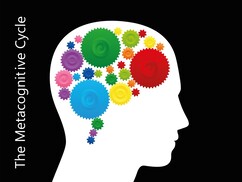 By: Madeline Kaleel I’ve spoken on this blog before about executive functioning, or the mental processes that allow for the control of behavior. Executive functions encompass decision making and behavior regulation skills, and difficulty with these functions can inhibit your ability to set goals, organize, self-monitor, or regulate your emotions. So, when you notice that your child, or even you, are struggling with executive functioning, what can you do? That’s where the metacognitive process comes in. Metacognition, sometimes described as “thinking about thinking”, is the ability to step back and take a “bird’s eye view” of yourself and what you’re doing, developing self-awareness of what problem-solving strategies work for you, and which ones don’t. The metacognitive process, or cycle, involves three stages to coach you or your child through in order to improve their self-awareness and ultimately their executive functioning: Self-Monitoring, Self-Evaluating, and Self-Regulation. To walk through what this cycle looks like, let’s consider the case of Ashley. Ashley is a new sixth-grade student that has been struggling with keeping up to date on her math homework. She often doesn’t turn assignments in, and when she does, they’re usually incomplete. How can we use the metacognitive cycle to help her? Self-Monitoring is referred to as the observing stage, where you ask yourself “what am I doing?”. Taking a step back, you look at the strategies you’re trying to use, how you’re going to use it, and you make sure you’re following the plan. In Ashley’s case, she uses an academic planner in order to keep up with her homework. She writes down her assignments and tries to remember to check it daily to make sure everything has been completed. Self-Evaluating is the judging stage, where you ask yourself “how am I doing?”. After utilizing a strategy or technique for some time, you look at your performance and outcomes and judge how well it worked. This could be as specific as looking at a grade for a specific assignment, or as broad as your grade for the semester. For Ashley, she looked at her math grade and realized she was not doing well. Even using the planner, most of her assignments are still missing, and her overall math grade is suffering as a result. Self-Regulating is the modifying stage, where you ask yourself “what do I need to change?”. If you had poor outcomes during the self-evaluating stage, this is where you change your strategy to something more effective. Sometimes that means the strategy didn’t fit well with the environment, the task, or the person using it. However, you could also discover that your strategy resulted in increased performance and no change is necessary. Ashley reflected on different ways of tracking her homework, and decided to try using her Google calendar instead, as well as set reminders specifically for her math homework. After the self-regulating phase, the cycle continues back to self-monitoring. By coaching your child through these steps, you ultimately increase their self-awareness and metacognition skills to a point where, in the future, they can coach themselves through the cycle. If you’re wondering how coaching them through the cycle works, check out Peg Dawson and Richard Guare’s books Executive Skills in Children and Adolescents: A Practical Guide to Assessment and Intervention and Coaching Students with Executive Skills Deficits.
1 Comment
|
Archives
August 2021
Categories
All
|
 RSS Feed
RSS Feed